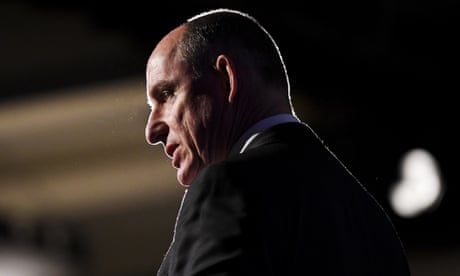- by foxnews
- 08 Apr 2025
?Right to know?: critics blast Coalition attempt to shield Future Fund from FOI laws
‘Right to know’: critics blast Coalition attempt to shield Future Fund from FOI laws
- by theguardian
- 30 Nov 2021
- in news

Legislation scheduled to be debated in federal parliament this week would shield Australia's Future Fund from freedom of information requests such as the one that revealed the sovereign wealth fund is investing in weapons manufacturers that sell arms to the Myanmar military.
The Australian government's Future Fund has more than $157m invested with 14 publicly traded companies that have done business with the sanctioned Myanmar military, which has been accused of war crimes and crimes against humanity.
Australia has investments with Aviation Industry Corporation of China, a Chinese state-owned weapons manufacturer that has sold combat aircraft to the Myanmar military, and Bharat Electronics, an Indian government-controlled company which has sold radar and sonar equipment to the regime.
The Coalition's Investment Funds Legislation Amendment Bill 2021 is slated to be debated in the Senate on Wednesday, the penultimate parliamentary sitting day of this year and possibly of this parliament.
The proposed law would exempt the Future Fund from releasing any details about its investments under FOI laws, including, as the department of finance confirmed to a Senate inquiry, information about which companies the fund has invested in and how much.
Greens senator Nick McKim has tabled amendments that would remove the Future Fund's FOI exemption and require the fund to publicly report its investments every six months.
The Future Fund, which controls nearly $250bn in funds and has 182 employees, has previously said the 10 to 20 freedom of information requests it receives each year are "administratively burdensome".
McKim told the Guardian it was "grossly inappropriate" Australia's sovereign wealth fund was investing public money in arms manufacturing, "let alone in Chinese state-owned corporations supplying weapons to Myanmar's military regime".
He said the fund should immediately divest its investments in arms manufacturers, and argued the proposed government legislation was unjustified and unnecessary.
"Rather than more secrecy, we need far greater scrutiny of their investments," McKim said.
"Under the government's proposal, we would never have found out about the Future Fund's investments in companies linked to the Myanmar military. The Australian people have a right to know how their money is being invested and into which companies."
Introducing the bill into parliament in August, the employment minister, Stuart Robert, said having Future Fund investments subject to the scrutiny of the FOI regime presented an "investment and governance risk".
Myanmar's military, known as the Tatmadaw, has faced international condemnation over its 2017 "clearance operations" - executed with "genocidal intent" according to UN investigators - against the ethnic minority Rohingya in Rakhine state, which included mass killings, including of children, as well as gang rapes, arson and torture. More than 25,000 Rohingya were killed, and 700,000 driven over Myanmar's border into Bangladesh.
The Tatmadaw, which has ruled Myanmar for much of its independent history, forcibly took control of the country in a coup in February and has since killed more than 1,200 civilians in a crackdown on pro-democracy protests.
The chief executive of Save the Children, Paul Ronalds, said Australia's Future Fund was established for the benefit of future generations, not to fund companies that provide weapons used by regimes accused of committing mass violence against children in conflict.
"The information uncovered highlights the need for greater transparency of Australia's investment in weapons manufacturers with the Australian public."
Rawan Arraf, the executive director at the Australian Centre for International Justice, said FOI laws had exposed the Future Fund's "astonishingly inadequate" environmental, social and corporate governance, and responsible investment policy.
"If it wasn't for access to freedom of information, we wouldn't know just how bad these investment activities are. Now, that mechanism is at serious risk. These investments should be reviewed and scrutinised by the public."
Arraf said Australian taxpayer funds should be invested ethically.
Clancy Moore, the Australian director at Publish What You Pay, said "transparency means Australians now know that our sovereign wealth fund is invested in weapons companies and big gas companies, like Total and Chevron".
"The proposed change would keep these investments secret from Australians."
Justice For Myanmar spokesperson Yadanar Maung said: "It is deplorable that Australia's Future Fund is seeking to profit from companies arming the Myanmar military and effectively financing its campaign of terror."
The Future Fund did not answer questions about its investments in companies linked to the Tatmadaw.
In a statement, a spokesperson said: "In line with its mandate from government, the Future Fund has built a broadly diversified portfolio which includes passive investments through external investment managers in thousands of entities globally.
"The fund has a well-established policy on environmental, social and governance matters and exclusions which takes account of its objectives, legislation, investment strategy, Australian law and the treaties that the Australian government has entered and ratified."
Neither the Aviation Industry Corporation of China nor Bharat Electronics responded to questions from the Guardian.
- by foxnews
- descember 09, 2016
Ancient settlement reveals remains of 1,800-year-old dog, baffling experts: 'Preserved quite well'
Archaeologists have recently unearthed the remarkably well-preserved remains of a dog from ancient Rome, shedding light on the widespread practice of ritual sacrifice in antiquity.
read more


